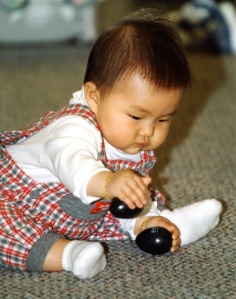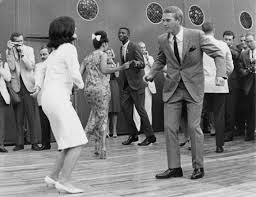Over the last few weeks I’ve heard “I think my child is too young to enjoy music”, “I don’t sing”, “none of my friends sing”, “I can’t believe how much my child loves making music” and “not enough people in our school are involved in music” a number of times, all in various contexts. These comments were bookended with an article I was dipping in and out of about a bandstand opening at the end of the 1800s with 25,000 people present. Although on the surface of it these remarks seem contradictory and incongruous they are curiously linked.
 It is almost beyond our imaginations I think, that 25,000 people would attend the opening of a small outdoor concert area in 2014, though what a dramatic shift in the enjoyment of and participation in music this is. Yet we also, for the most part, consume music in a contrasting manner, no longer in the family or with-drawing room with family and visitors or at public dances but privately, most frequently through headsets or in cars. This change of consumption and involvement is at the heart of what makes a growing number of people uncomfortable at the idea of being the music-makers and the decrease in understanding of how music develops as children grow. With headsets we absorb a polished performance of which we are no part, out at the bandstand or in our homes we receive and soak up the information in an undisguised form.
It is almost beyond our imaginations I think, that 25,000 people would attend the opening of a small outdoor concert area in 2014, though what a dramatic shift in the enjoyment of and participation in music this is. Yet we also, for the most part, consume music in a contrasting manner, no longer in the family or with-drawing room with family and visitors or at public dances but privately, most frequently through headsets or in cars. This change of consumption and involvement is at the heart of what makes a growing number of people uncomfortable at the idea of being the music-makers and the decrease in understanding of how music develops as children grow. With headsets we absorb a polished performance of which we are no part, out at the bandstand or in our homes we receive and soak up the information in an undisguised form.
Music is an integral part of human nature which we are never too young to begin and never to old to complete, it has the capacity to make us both joyful and melancholy whilst professional musicians train for longer than either astronauts or medical doctors. It is quintessentially natural; though to become professional requires elongated and persistent hours of rigorous practise. Whilst we cannot make mini-Frank Sinatra’s or Mozart’s we can provide enough support that everyone is able to enjoy music.
It’s true that the youngest baby will not sing to us in tune or move with accurate rhythm but they can and do react to music, making cooing sounds and moving to it in a way which they, at that age, are able to. They don’t perform on cue, any more than they will repeat back “dada” when Daddy does come into sight.  We want and need to stimulate that feedback loop and sing back to them the sounds that they make and keep doing that whilst they are growing and finding their voice. In a similar vein when kids start moving and dancing we should show them that we can move that way too, not to mimic them but to reassure them that we recognise their movement. This nurturing is musical sustenance, and constructs a scaffolding they can build on throughout their early childhood to develop into knowing when they are singing in tune and moving with rhythm. It’s not a necessity that a musical instrument (and I include vocal here) is chosen once basic music competence is achieved in order to continue supporting musical development and enjoyment. We do, nevertheless, need to embrace the naturalness of making music, seek opportunities for maintaining musical alacrity and as a natural pathway from that, embolden those who are seeing a diminishing number of their peers who actively make music.
We want and need to stimulate that feedback loop and sing back to them the sounds that they make and keep doing that whilst they are growing and finding their voice. In a similar vein when kids start moving and dancing we should show them that we can move that way too, not to mimic them but to reassure them that we recognise their movement. This nurturing is musical sustenance, and constructs a scaffolding they can build on throughout their early childhood to develop into knowing when they are singing in tune and moving with rhythm. It’s not a necessity that a musical instrument (and I include vocal here) is chosen once basic music competence is achieved in order to continue supporting musical development and enjoyment. We do, nevertheless, need to embrace the naturalness of making music, seek opportunities for maintaining musical alacrity and as a natural pathway from that, embolden those who are seeing a diminishing number of their peers who actively make music.
Many parents of young children know the multitude of benefits of supporting their child’s musical development at the earliest of ages. Others know it though economics dictate that they are not able to participate and still others do not see it as a necessity. The demographics speak for themselves in terms of economics deciding who has the opportunity to develop this basic life-skill, it should not be so. Even thirty years ago every kindergarten classroom had a piano and a teacher who played it. The presence of a piano would have been the support those children needed at the developmental stage they are at in kindergarten. We may want a wide breadth of music for our kids and realise this supports their musical whole in a way in which only Baa Black Sheep and Wheels on the Bus cannot; the open opportunity to sing, together as a class is not to be ignored as a powerful way to support the natural musical aptitude we are all born with. Though far too many elementary schools are cash-strapped we have evolved to a time when many do not have music as a core part of the curriculum. Without supporting children’s musical development throughout elementary school we are letting these children down and it is they who move on to be the non-singers / won’t singers / believe they can’t singers. If we miss the opportunity to grow and support this natural life skill we leave a gap in the world of far too many children and one which has an impact on the rest of their lives. It is they, now the majority, who wouldn’t contemplate attending the opening of a bandstand. Without the ability to enjoy music they won’t be at the next big-opening of an outdoor (or indoor) concert hall. Unable to enliven their spirits through or with music they won’t be joining others to do the same. We need music though, to build community, to celebrate, to acknowledge lives and events, to inspire and to include. The language of music crosses boundaries, not only the spoken word or different dialects but cultural horizons too. Even in our flat and instant world we need this connectedness.
